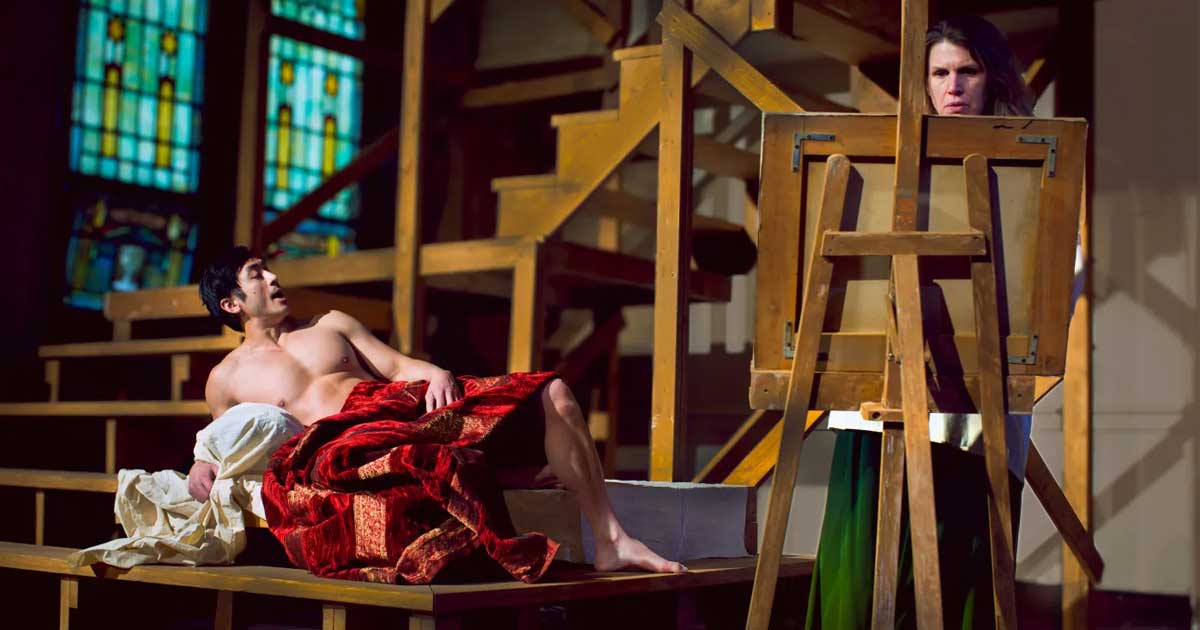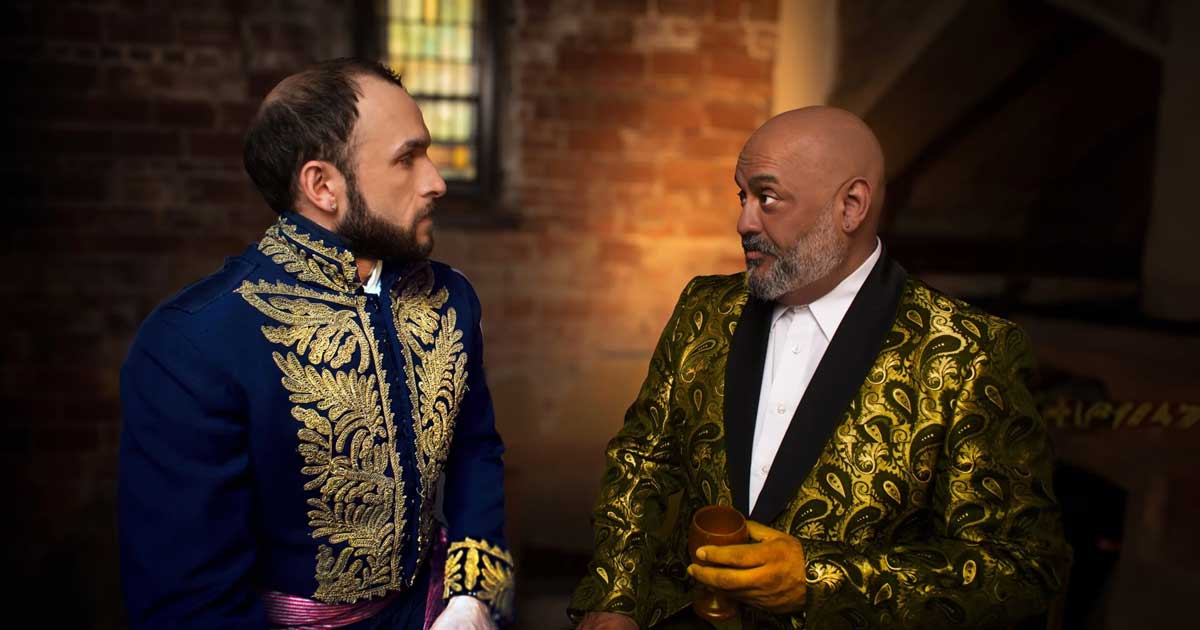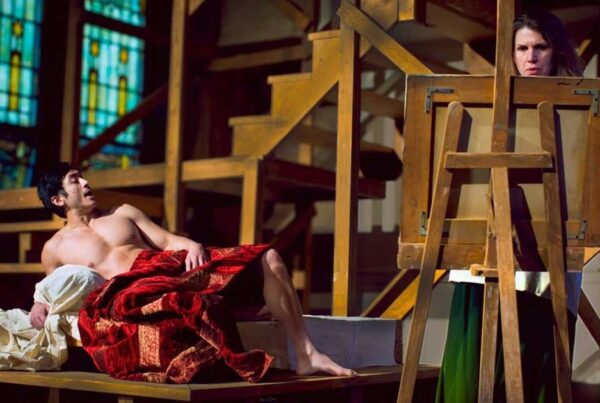
The Pittsburgh Tatler – Playwright Howard Barker is known for creating worlds of remorseless cruelty. Many years ago I was part of the creative team for a production of his play The Castle, in which, as punishment for a crime, a woman is sentenced to be chained to a corpse for the rest of her life. Brutal.
So I might be forgiven for feeling a bit of trepidation about a play from his pen titled Scenes from an Execution, which Quantum Theatre opened in Allentown this past weekend.
Fear not, intrepid Reader: the only thing that is executed in this play is a painting: a depiction of the 1571 Battle of Lepanto that the Venetian state – and, specifically, its Doge (Robert Ramirez) – has commissioned the free-spirited and mercurial artist Galactia (Lisa Velten Smith) to create – that is, to “execute” (no paintings die, either). Venice wants an image that will laud its victory over the Ottoman enemy; Galactia wants to depict the reality of war, with all its pain, suffering, and horrific brutality. Her obstinate refusal to bend to the political winds eventually lands her in a dark and filthy dungeon, but the ultimate punishment Barker doles out to his (evident) surrogate is even more dreadful: in the end, the Doge puts the painting on public display as a demonstration of his magnanimous commitment to art and tolerance, thereby managing to coopt both art and artist.
Barker’s main idea – that even the most radical and resistant of artistic expression gets absorbed into the execution of power – is not a new one, but the play spools it out in a complex and compelling fashion. Galactia’s status as a female artist means that she is also battling against sexism and double standards. On the one hand, her daughters (Mariana Garzón Toro and Leyla Davis) worry that if she offends the powers-that-be, she will waste the opportunity she’s been given to break new ground for women artists; on the other hand, both her character and her work are predictably assassinated in gendered terms (she is lambasted for her sexual freedom – in particular, for her adulterous affair with fellow artist Carpeta (Hansel Tan) – and her work is labeled “shrill”).

Jerreme Rodriguez and Robert Ramirez as the brothers Suffici and the Doge.
(Image: Jason Snyder for Quantum Theatre)
Ironically – and, for a person like your Tatler, somewhat gratifyingly – the figures who wield the greatest power within the world of this play seem to be the scholar-critics who interpret and contextualize art and its meanings. In the first act, that role is filled by Sketchbook (Amy Landis), a modern-day art historian who narrates disparate “scenes” from the unseen painting’s “execution” and gives us insight into its intrinsic value as a work of art, in terms of its style, composition, and content. She also describes the painting so vividly that it is as if it’s right in front of us. In the second act, the role is filled by the Doge’s scholar friend Gina Rivera (Bria Walker-Rhoze), who understands that “in art nothing is what it seems to be” and becomes the mastermind who devises a framework through which both the painting and the painter can be absorbed into the State’s interests. Both of these figures are responsible, within the world of the play, for ensuring that the artwork perseveres; both also secure the impact of both the artist and her art.
Andrew William Smith has directed with an actor’s sensitivity to the ambiguous complexities of Barker’s characters, a clear-eyed understanding of the play’s theatrical needs, and a sly sense of humor. Yes, you read that right: the play is in many ways a comedy – maybe the funniest play in Barker’s oeuvre – and the strong ensemble is well-attuned to the dialogue’s mischievous wit. Particularly formidable in this regard are Jerreme Rodriguez as the narcissistic Admiral Suffici, who throws a fit because he doesn’t like the way Galactia has painted his hands; Randy Kovitz as the sad-sack Prodo, who makes a living charging people to view his unusual war wounds; and Martin Giles (Cardinal Ostensible) and Robert Ramirez (Doge Urgentino), both of whom deftly sidestep the pitfalls of making their characters unctuous villains and instead give us portraits of men who are secure enough in their power to wear it lightly and wield it with flair. But it’s powerhouse Lisa Velten Smith who drives the action, both comic and otherwise, as the strong-willed, frank-talking, take-no-prisoners Galactia. In the course of the evening she gets a physical workout, too, as she traverses pretty much every inch of scenic designer Chelsea Warren’s multi-level and multi-purpose set, which evokes both a painter’s scaffolding and a gallows. Angela Vesco’s costumes set the action in a luxurious 16th-century Venice, and the lighting and sound design (C. Todd Brown and Steve Shapiro) adroitly modulate the mood of the action.
Towards the beginning of the play, when Prodo comes to her studio to model for the painting, Galactia accuses him of being a “monkey” because he has turned himself, and his suffering, into a form of entertainment. By the play’s end, all of her efforts to “bring the truth to birth” have brought her to a similar fate – she’s a celebrity draw at the Doge’s table. Has she compromised her principles, or simply – like Brecht, and countless other artists – made the pragmatic decision to survive in order to continue to speak truth to power? And is that even possible in a world in which power absorbs all resistance? Barker and his play don’t offer any unambiguous answers, only potent questions.




